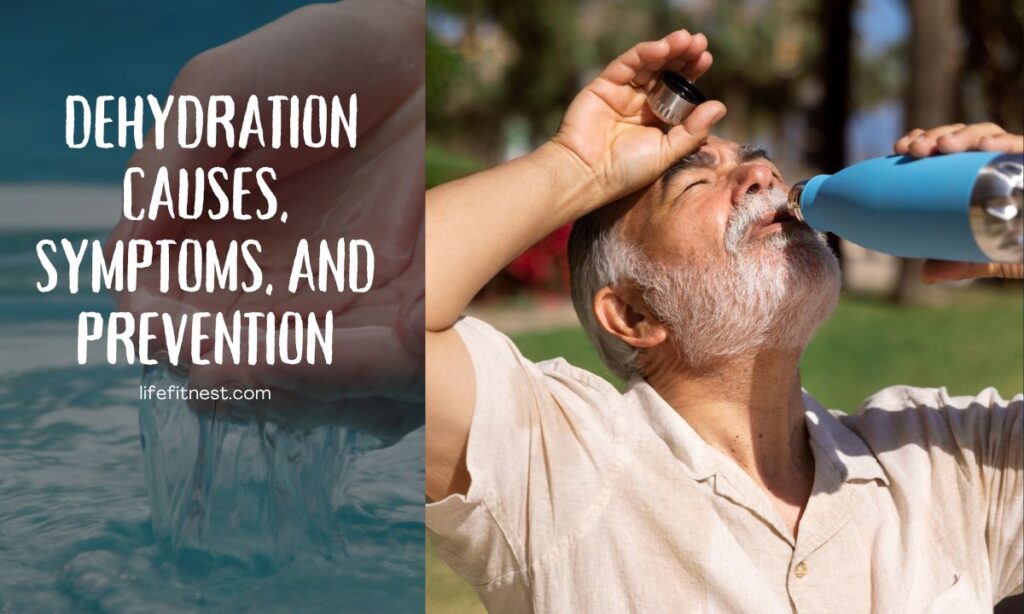Dehydration occurs when the body loses more fluids than it absorbs, preventing it from performing its normal functions efficiently. This condition can range from mild to severe and affects people of all ages. Despite their commonality, many people ignore or misinterpret the signs and symptoms, delaying treatment and potentially worsening the situation.
Dehydration can be caused by various factors, including excessive sweating, fever, diarrhea, or vomiting. Understanding the signs, symptoms, causes, and preventive measures is critical for maintaining good health and avoiding complications from this easily preventable condition.
Symptoms Of Dehydration
As dehydration progresses without adequate intervention, symptoms may worsen, indicating that the body’s water requirement has become critical.
Physical Discomforts: A lack of hydration can cause unpleasant physical symptoms such as severe dry skin, persistent headaches, and muscle cramps. Electrolyte imbalances caused by low fluid levels commonly cause muscle cramps. Furthermore, you may experience an unusual decrease in sweating. Sweating normally helps regulate body temperature, but dehydration interferes with this process.
Signs of Serious Dehydration: More alarming symptoms may appear when dehydration is severe. are symptoms of the body’s attempt to keep blood flowing to vital organs despite low fluid volume. Furthermore, sunken eyes become visible when the body’s tissues lack adequate water. In severe cases, dehydration can cause fainting spells due to a significant drop in blood pressure. These severe symptoms necessitate immediate medical attention to avoid further health complications.
Causes of Dehydration.
Dehydration happens when fluid output exceeds intake. It can be caused by fever, in which the body loses fluid through sweat to cool itself, or by gastrointestinal issues such as diarrhea and vomiting, which rapidly deplete the body’s water supply.
Excessive urination, which is often caused by medical conditions like diabetes or the use of diuretics, also plays a significant role. Not drinking enough water, especially in hot weather or while physically active, can cause dehydration.
Preventing Dehydration
Staying ahead of dehydration requires mindful habits and lifestyle changes. Instead of waiting until you’re thirsty, hydrate consistently throughout the day. Feeling thirsty often indicates that dehydration has already begun, so it is critical to drink fluids constantly to maintain optimal hydration levels.
Including high-water-content foods in your diet, such as fruits and vegetables, can help you meet your daily fluid needs. Increasing fluid consumption during activities that increase your risk of dehydration, such as exercising, spending time in hot and humid environments, or being ill with fever or gastrointestinal symptoms, is critical.
Must Read: Kettlebell Goblet Clean: Technique Tips & Benefits
Educating yourself on the importance of hydration and recognizing the early signs of dehydration can help you take prompt action to prevent the condition from worsening. Simple practices like carrying a water bottle with you wherever you go and choosing water or electrolyte drinks over sugary or caffeinated beverages can have a significant impact on your hydration levels.
Special Considerations
Certain groups are more susceptible to dehydration. Young children and the elderly may not feel or express thirst adequately, making it difficult for them to manage their hydration on their own. People with chronic illnesses or those taking medications that cause increased urine output should be especially cautious. Those who engage in strenuous activities or live in hot climates should increase their fluid intake to compensate for increased sweat loss.
Treatment for Dehydration
Mild dehydration can typically be treated at home by increasing fluid intake. Water, oral rehydration solutions, and electrolyte drinks can be sufficient. However, moderate to severe dehydration may necessitate medical intervention, in which fluids are replaced more quickly, sometimes intravenously. Recognizing the early signs of dehydration and responding quickly can help prevent the condition from worsening.
Conclusion
Dehydration is a preventable condition that can be avoided with proper attention and care. Listen to your body’s signals for water and incorporate healthy hydration habits into your daily routine. This helps to maintain your body’s fluid balance, which supports its functions and overall health.
FAQs
How can I check myself for dehydration?
You can easily check for dehydration at home. Pinch the skin on the back of the hand, the abdomen, or the front of the chest below the collarbone. This will display skin turgor. Mild dehydration will cause the skin to take slightly longer to return to normal.
What dehydration feels like?
You can tell you’re dehydrated if you’re thirsty, tired, peeing less, or have symptoms like muscle cramps, dizziness, headache, or unsteadiness.
What not to eat when you are dehydrated?
Avoid alcohol, caffeine, soda, and sugar-sweetened beverages, as they can dehydrate you even more. If you have kidney problems, the foods on this list may not be suitable for you, and a healthcare professional may need to closely monitor your electrolyte and nutrient intake.
What hydrates better than water?
According to research, milk is one of the best beverages for staying hydrated, outperforming water and sports drinks. Researchers credit milk’s effectiveness to its natural electrolytes, carbohydrates, and protein.


![Understanding Leukemia: A Comprehensive Overview [2024]](https://newstechblog.com/wp-content/uploads/2024/08/cancerHealth-1-1024x536.png)
![Coughing up Phlegm: Causes, Symptoms, and Treatment [2024]](https://newstechblog.com/wp-content/uploads/2024/08/Coughing-up-Phlegm-Causes-Symptoms-and-Treatment-1024x614.jpg)